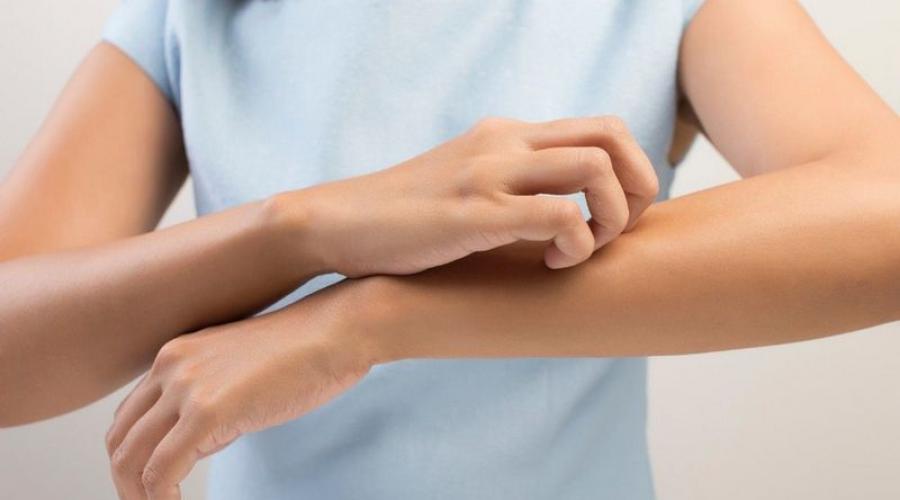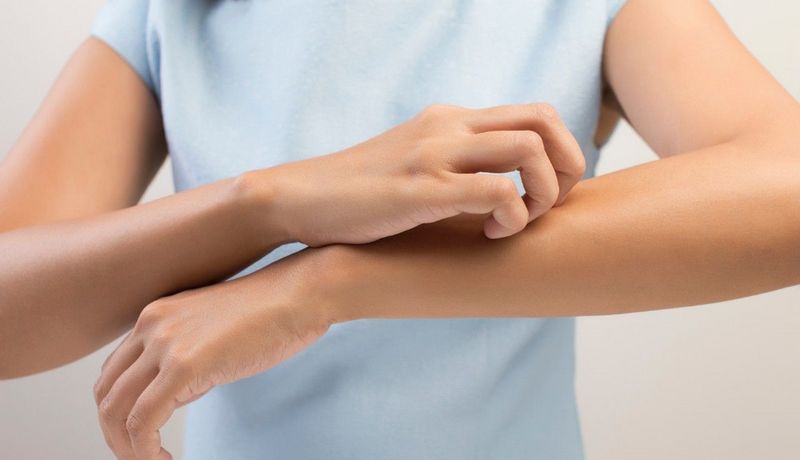Tablets for skin itching - inexpensive and effective drugs

Itching is a symptom of many diseases: inflammatory reactions, allergies, infectious skin lesions, pathological conditions of internal organs. Sometimes the skin itches so badly and unbearably that a sick person is ready to smear himself with any means to get rid of the torment.
In pharmacies, you can buy not only ointments, but also effective pills for skin itching. The choice of drug depends on the source of the unpleasant ailment.
Article plan:
For what diseases is it indicated to take tablets from burning?
Itching tablets are allowed to be drunk both for general diseases in which the whole body itches, and for lesions of certain areas of the skin. The list of the first pathologies includes:
- deterioration of metabolism;
- kidney failure;
- hormonal imbalance;
- diabetes;
- oncological diseases of the blood;
- dysfunction of the endocrine glands;
- hepatitis;
- cholecystitis;
- urolithiasis disease.
The list of second diseases in which itching is localized to specific areas of the skin includes:
- eczema;
- dermatitis;
- scabies;
- fungal infection;
- allergy;
- seborrhea;
- pediculosis.
Itching can manifest itself not only in certain areas of the skin of the body, but also on the mucous membranes: in the area of the anus with helminthiasis and hemorrhoids, on the genitals with thrush.
Features of the action of tablets from itching
For effective treatment of pruritus, it is necessary to determine the source of painful sensations. The skin may itch due to the body's reaction to allergens or nervous shocks. In these situations, other symptoms are not observed.
Itching also signals dermatitis and other inflammatory lesions of the skin, serious violations of the functioning of organs and systems. In these cases, complex treatment is required. First, the source of the disease is eliminated, then the inflammation is extinguished, skin irritation is removed.
 Usually, doctors at the beginning of therapy prescribe external medications to patients. But if ointments and creams do not have the desired therapeutic effect, then highly effective tablets are prescribed. Medications are selected depending on the specific disease that provokes itching. You should not self-medicate. Only a medical specialist can make a correct diagnosis and prescribe the optimal treatment.
Usually, doctors at the beginning of therapy prescribe external medications to patients. But if ointments and creams do not have the desired therapeutic effect, then highly effective tablets are prescribed. Medications are selected depending on the specific disease that provokes itching. You should not self-medicate. Only a medical specialist can make a correct diagnosis and prescribe the optimal treatment.
It is desirable that the doctor prescribes drugs that have the following characteristics:
- quality and high efficiency;
- the minimum number of side effects;
- long-term therapeutic effect.
According to the chemical composition and purpose, tablets from skin itching are divided into the following types:
- anesthetics;
- hormonal;
- antiallergic;
- potent.
Strong drugs containing antibiotic components, corticosteroids and other active substances are only allowed to be used with a doctor's prescription. These tablets have many pronounced side effects, in case of their overdose, severe disturbances in the functioning of the body can occur.
Antihistamine tablets
Antihistamines, designed to eliminate allergic reactions, are the most popular and commonly used remedies for itching of the head and body. These tablets reduce the content of histamine in the body - a biogenic compound, an increase in the concentration of which in the blood indicates the development of allergies.
With a decrease in the amount of histamine, the body is easier and more actively resists the inflammatory process. Antiallergic medicines help get rid of burning sensations, rashes, redness of the skin. They are divided into the following types:
- first generation tools;
- second generation drugs;
- antidepressants.
 First generation itch medications:
First generation itch medications:
- Diphenhydramine,
- Tavegil,
- Suprastin.
They have a quick healing effect, well eliminate the rash, reduce burning sensation. They are often used to treat all types of allergies, accompanied by swelling, rashes, burning itching, redness of the skin, as well as hives, chickenpox, insect bites.

These tablets can treat dermatitis of any origin. However, first-generation drugs cause adverse side effects: addiction, decreased concentration, drowsiness. Therefore, at present they are rarely prescribed by doctors. It is also forbidden to take them to small children and pregnant women.
Second generation itch pills are improved drugs that do not depress the functioning of the nervous system, do not reduce concentration, and do not cause drowsiness.
Claritin, Loratadin, Cetirizine and similar medicines perfectly eliminate itching, extinguish inflammation and prevent its resumption. They are often used to treat severe allergies accompanied by hives, dermatitis of any origin, and other skin conditions.
 Doxepin, Amitriptyline and other antidepressants are intended to relieve nervous system overexcitation.
Doxepin, Amitriptyline and other antidepressants are intended to relieve nervous system overexcitation.
They are used to eliminate intense allergic reactions, as well as dermatitis caused by exposure to allergens or nervous strain. These are strong and active drugs with many side effects.
Hormonal pills
Hormonal medicines for itching are based on corticosteroids, hormones produced by the adrenal cortex. These tablets stop the transmission of nerve impulses, as a result of which itching is significantly reduced.
Also, drugs relieve inflammation well, have an anti-allergic effect, eliminate puffiness, and reduce pain in damaged areas of the skin. Hormonal pills are used for diseases that provoke itching of the whole body. They are highly effective, but have strong side effects.
 The best drugs for itching, based on hormones, are:
The best drugs for itching, based on hormones, are:
- Metipred,
- prednisolone,
- Dexamethasone.
Since these medicines are potent, capable of having a negative effect on the human body, it is highly not recommended to take them for a long time. The maximum course of treatment should not exceed two weeks.
If the prescription is not followed and the dosage is exceeded, there are violations of the digestive tract, suppression of the immune system, and hormonal imbalance.
Tablets for anal and vaginal itching
Doctors prescribe pills for itching in the anus only if ointments and creams - external medicines - do not help. The mucous surface of the anus may itch after the appearance of cracks or hemorrhoidal bumps. But most often the causative agents of itching in the anus are helminths.

In this case, in order for the anus to stop itching, it is enough to get rid of the worms in the intestinal tract. If the itching is too strong, painful and incessant, then the doctor may prescribe pills to the patient that block opiate receptors.
 The most popular such agent is Naltrexone. This drug successfully eliminates even unbearable anal itching, but has many side effects:
The most popular such agent is Naltrexone. This drug successfully eliminates even unbearable anal itching, but has many side effects:
- migraine,
- dry mouth,
- convulsions,
- indigestion.
Pills for itching in intimate places are prescribed after determining the source of the disease.
Genitals can itch due to candidiasis, bacterial infection, sexually transmitted diseases, and even allergies to semen.
If the cause of itching is thrush, then the gynecologist prescribes antifungal drugs, if vaginitis or colpitis, then antibacterial drugs, and if an allergic reaction, then antihistamine tablets. Medicines for vaginal infections should be taken only on the advice of your doctor.
Tablets for psoriasis
 In psoriasis, a rather intense and painful itch is usually noted. Therefore, psoriasis drugs should have a good and stable therapeutic effect. Calcineurin-inhibiting drugs have proven themselves well. These tablets inhibit the activity of enzymes that regulate calcium delivery to cells during an inflammatory response.
In psoriasis, a rather intense and painful itch is usually noted. Therefore, psoriasis drugs should have a good and stable therapeutic effect. Calcineurin-inhibiting drugs have proven themselves well. These tablets inhibit the activity of enzymes that regulate calcium delivery to cells during an inflammatory response.
Also, drugs for psoriasis can block the synthesis of serotonin and histamine. The best calcineurin inhibitor medications to help get rid of severe itching are:
- tacrolimus,
- Cyclosporine.
Contraindications
It is forbidden to drink pills for itching in the presence of the following diseases:
- predisposition to allergic reactions;
- deterioration in the functioning of the liver and urinary system;
- narrow angle glaucoma.
It is also contraindicated to take medication for itching during pregnancy and lactation. Pregnant women and breastfeeding mothers are allowed to use only external preparations, and always under the strict supervision of the attending physician.
Side effects
Most often, when using tablets for the skin, especially anti-allergic, drowsiness is observed. But nowadays, many pharmaceutical companies already know how to produce drugs that do not cause the desire to sleep. Also, after using medications for itching, some patients experience the following side effects:
- migraine;
- dizziness;
- tachycardia;
- indigestion;
- allergic reaction.
Overdose
 You can't joke with skin burning pills. In case of accidental or deliberate use of an excess amount of the drug, death can occur. An overdose of antiallergic drugs is especially life-threatening.
You can't joke with skin burning pills. In case of accidental or deliberate use of an excess amount of the drug, death can occur. An overdose of antiallergic drugs is especially life-threatening.
With excessive intake of antihistamine tablets in an adult, hallucinations, convulsive muscle contractions, intense pain in the head, increased heart rate, and impaired coordination of movements are recorded.
In young children, the symptoms of poisoning develop rapidly, are very intense, in most cases have sad consequences. When using a large number of tablets from itching, you must immediately rinse the stomach and take activated charcoal. For some time, a doctor should observe a person being treated for poisoning.
Interaction with other drugs
- It is forbidden to take different drugs for itching at the same time.
- It is impossible to combine medicines with alcohol, as well as with medicines made on the basis of alcohol.
- Some anti-itch pills do not work well with antibiotic and sleeping pills.
Therefore, before using medicines, be sure to carefully read the instructions. Also, do not ignore the advice of a doctor who prescribed pills for skin itching.